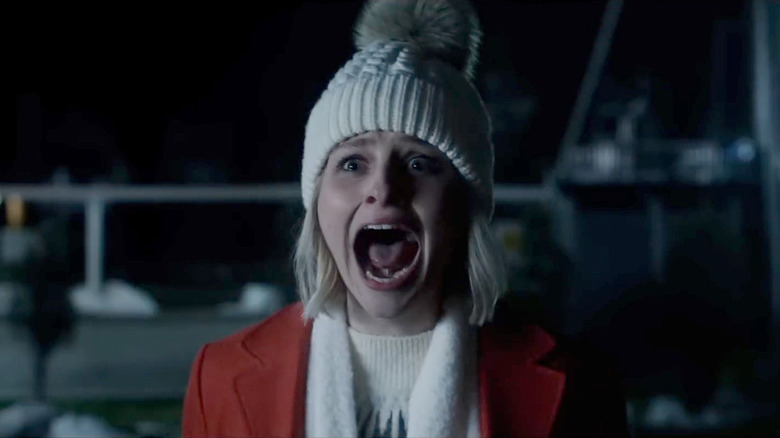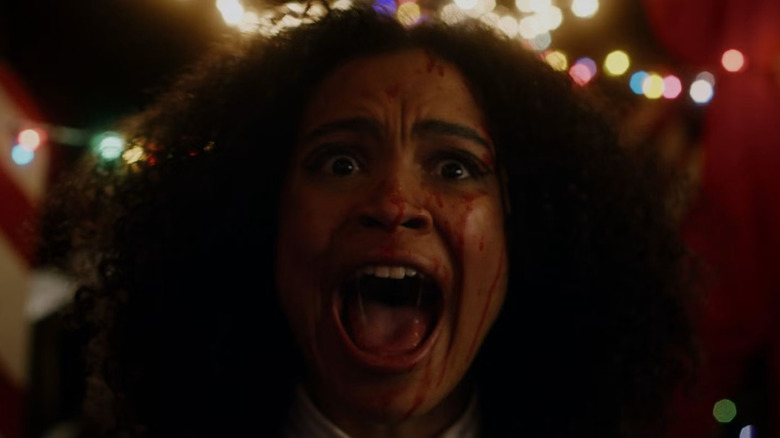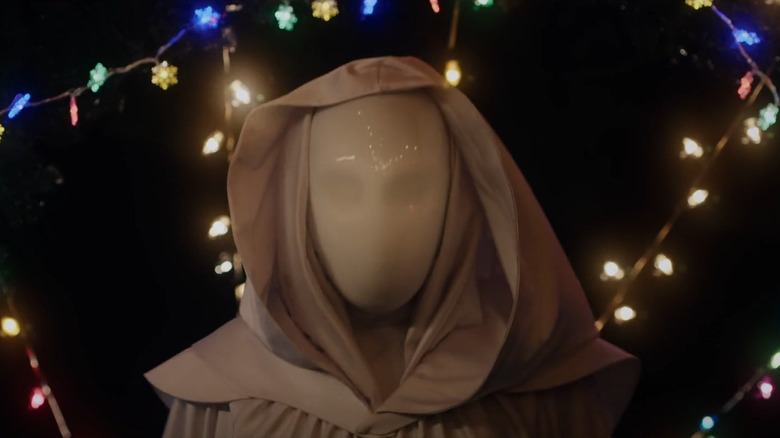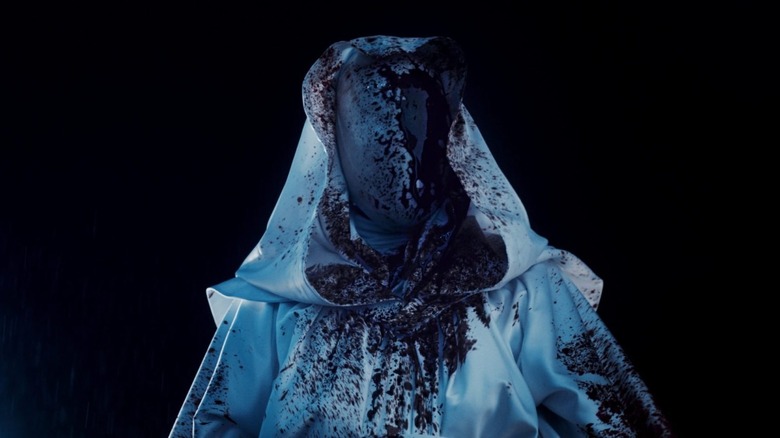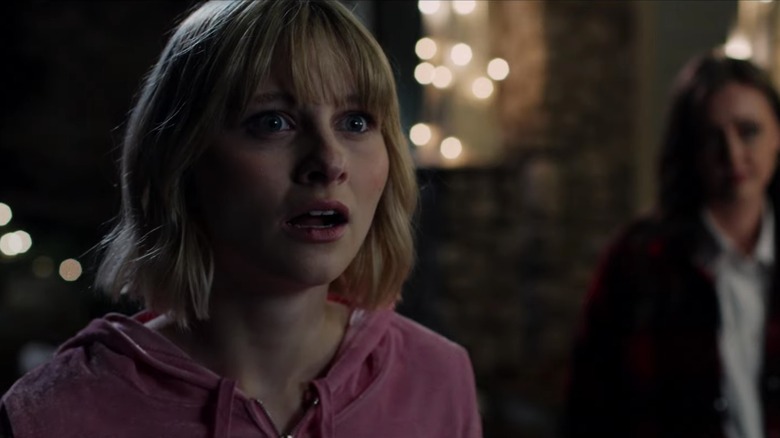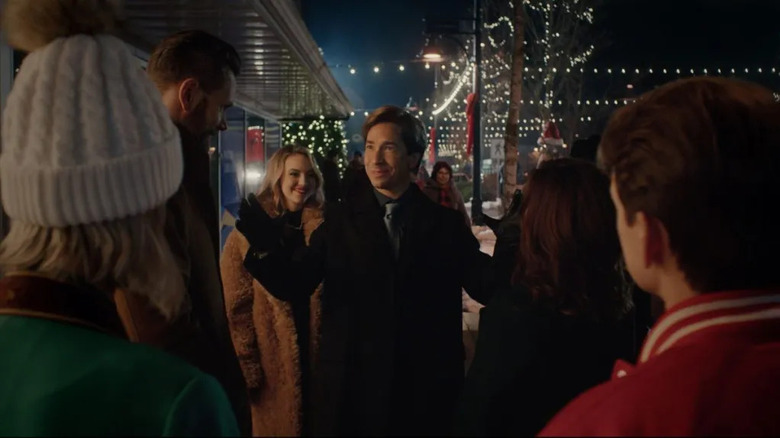It's A Wonderful Knife's Writer & Director Talk Slasher Sweetness And Review-Bombing Bigots [Exclusive Interview]
The heart of the canon of Christmas horror movies is growing three sizes this year thanks to "It's a Wonderful Knife," the yuletide slasher from "Tragedy Girls" and "V/H/S/99" director Tyler MacIntyre and "Freaky" screenwriter Michael Kennedy. I've been working in this industry for quite some time, and MacIntyre and Kennedy are two people I've been privileged to get to know over the years. Both are responsible for two of my favorite horror films of the last decade, so seeing them join forces for a holiday horror flick has reignited my belief in Santa Claus, because he certainly got my letter. The new film tells the story of Winnie Carruthers (Jane Widdop), who, one year after becoming a final girl and saving the town of Angel Falls from a psychotic killer on Christmas Eve, wishes she was never born and wakes up in a parallel universe where she doesn't exist ... which means the killer has never been stopped.
I was fortunate enough to catch "It's a Wonderful Knife" during its premiere at Beyond Fest, where MacIntyre and Kennedy told stories about working on the project together and answered many of the burning questions I already had.
For example: They were able to cast Justin Long because he was already in Canada shooting the new "Goosebumps" series, Kennedy had pitched the "It's a Wonderful Knife" title first, and he became a producer on the project after watching a different, unreleased screenplay of his turn into something unrecognizable (a shockingly common occurrence in Hollywood) during production and wanted to make sure this film would not experience a similar fate. But we still had plenty to talk about when we sat down recently, including the fact that, yes, all of the different Christmas movies and slasher flick references littered throughout were by design.
Note: This interview has been lightly edited for clarity and brevity.
'I wish Ben Shapiro would weigh in'
Review bombs usually happen when a Marvel movie puts a woman or a person of color in the picture. You know, [sarcastically] really edgy decision-making here. But "It's a Wonderful Knife" is already getting a bevy of bigoted reviews on Letterboxd.
MacIntyre: F*** those people.
Kennedy: Yeah, for me, three years ago, four years ago, I probably would be upset. But like you've seen, I posted a couple of them [on social media], because I'm like, "Hell yeah. This is a great review." Calling it "gay, anti-suicide propaganda?" That's a five-star review to me.
MacIntyre: Also, who's like, "Oh, man, we really need suicide movies." What?
Kennedy: I jokingly have said this before, but I also would kind of love it ... I wish Ben Shapiro would weigh in because then everyone would know about the movie. [laughs]
That's an excellent point!
MacIntyre: We should send him a screener.
Kennedy: We should send him a screener. But, it is upsetting when you think about it deep enough, just how f***ed up it is that we're still doing this and it's getting worse in ways. It's just not going away. But also, at the end of the day, we did something right. There was a guy on Twitter harassing me saying I was "trying to make kids gay with this movie."
It's upsetting to know that there are humans who actually believe that and think that and then try to push laws about it. So, it is upsetting because it's like, this is probably the most harmless movie you'll see with people dying. It's such a sweet movie. It's just so crazy that someone can get that angry over just characters existing. But also like Tyler said, f*** them. Thanks for your $5 on a Monday at the Mystery Movie!
Finding the sweet spot of scares
This really is such a sweet movie ... where people also get butchered. Tyler, as a director, how are you able to make sure it resonates on screen that yes, this is a slasher movie, but also sickly sweet at times?
MacIntyre: It's something we're mindful of the whole time, I think definitely on the script level, but a lot of that was already there when I was brought on board and then it just became a question of finding the right way to bring it to life. Casting for me is very surgical. I have to really consider the group dynamics of it and do a lot of discussions around that stuff because people can really throw off the vibe. And we looked at a lot of people. For me, the hardest part to cast was Bernie, just because they have such a specific eccentricity to them but have so much heart, but then you have to kind of slow play them and they have to be legitimately strange, but then also ultimately win everyone over. And so it was a question of trying to keep those things in mind without it getting too saccharine. How do we find the comedy between the characters? But they also let the jokes that are there kind of land.
I try to gather, when time permits, as many kinds of options as possible. We get what's on the page and then we try a few things out so that you can course correct a little bit. And it just becomes, at that point, really just about gut checking with each other, between Michael and myself, and the other producers, but being honest about what does and does not work. And we've all made concessions with that in mind being like, "Hey, I know you really love this, but it's distracting from other things."
Once you actually start showing it to people out in the world, people tell you what they think. They're not lying. You can see if a joke works, you can see if a jump works, and sometimes a joke's not for everybody. Sometimes it's the crack of a smile type of joke. And that goes with the drama as well. If people buy those relationships and are clapping when they embrace at the end, then you know you did something right and you can just sort of push things in service of those moments.
On paying homage to a slasher classic
Definitely. I told Michael at the Beyond Fest screening that I got choked up at the end because I was so invested. My next one is for Michael, because what those reading this interview might not know about you is that you are a slasher scholar. So I gotta ask about the stair scene, which feels like you doing the "Scream 2" car scene. How do you avoid the trap of just blatantly ripping it off and instead make it your own?
Kennedy: I mean, I think it's just as simple as the location's different. The sequence is a little different. There are more people. But it also, to me, I weirdly knew going into writing the script when I figured out my outline, that sequence was going to be, for me, a big sequence in the script. I wanted to do a cop car sequence. I just love that sequence so much in "Scream 2" and think it's so tense. And I just kind of took that nugget and go, "Okay, what's a version in this world? Where would it go? Where would it exist? How? Why?"
And not to spoil the movie, but it ties into a twist in the film too, which is different than "Scream." But you're not wrong at all. It was definitely cop car-inspired. And I know I watched the cop car scene 50 times, and I read the script and wanted to see how Kevin [Williamson] framed it. I mean, there were even times in the edit where I'd sent the temp music track from the cop car sequence to Tyler and I was like, "Can you try cutting this into the temp score just to see what it feels like?" And it was crazy how much it worked. And Tyler did some fancy editing to the music because the cop car sequence is I think a little bit longer.
I mean, I love that sequence so much. I think it's one of my favorite sequences in a slasher movie, ever. I also love scaring an audience and being scared of something so confined. To me, that cop car sequence is a chase scene, but it's not people running all over. It's literally climbing over one person.
Totally. Your anxiety goes through the roof if you put yourself in that position.
Kennedy: Yeah, I remember seeing it in a theater with my friend Kara in high school and I had already seen the movie and she hadn't, and I remember her just ... my arm was sore when that scene was over because she was digging into it that whole entire sequence.
I love that. [laughs]
On directing teen girl stories without ever being one
My next question is for Tyler, and I'm prefacing this by saying that, obviously, gender is a construct, but between this and "Tragedy Girls," you're directing horror stories that deal with teen girls. And if I had to make a list of male directors I trust to tackle teen girl stories, you are definitely one of them. So, how do you do it despite not having the lived experience?
MacIntyre: Oh, well, thank you so much. I mean, I'm really quite concerned about that and it's something I've definitely debated about and I've definitely turned down projects where I'm like, "Guys, let's cast a wider net." But for me, it is about trying to find the right story, a story that I think I can bring some perspective to, and a lot of it has to do with the point of view it has. I get really excited about trying to get into somebody's head and then having the entire style of the movie fall from that. It's a very psychological approach, but I'm constantly concerned about the authenticity of it. And we're operating in a bit of a different tenor. It's not the most realistic thing. The performances are a bit heightened, especially in "Tragedy Girls" and in this, we're kind of saturating a certain type of film.
So with that, it kind of lets you off of the realism hook of it a little bit, but you still have to realize that you're telling a story about people that you don't have direct, one-to-one analogous experience of the world. And therefore I find that I look to find very sophisticated partners on the performance side. Even things like when we were writing "Tragedy Girls," we did a table read with two 17-year-old performers to workshop the dialogue and just go through and figure it out. And you realize very quickly that a lot of it's not about the exact way that those people sound, but how they want to sound. Trying to be honest with yourself about what needs work, but then also being deferential to the people that you've cast and having them bring the perspective and trying to inspire them to bring ownership to it, because [that's] the only way it's going to become authentic.
I've gotten very lucky with the leads that I've had in my career across the board, like Brianna [Hildebrand] and Alex [Shipp] in "Tragedy Girls," definitely. It took a couple of weeks to kind of warm up to it, but once they were in, they were all in. It really helped the movie in terms of, it very much became kind of their thing. We had a similar thing with Jess [McLeod] and Jane [Widdop] on this where it changed the plot in a large way, the type of things that they were finding. It was just a question of figuring out where the gold is, and they'll tell you — you just have to pay attention.
The value of Justin Long
All of the characters in "It's a Wonderful Knife" feel so lived in. And then at the same time, we have Justin Long who is basically a human cartoon in the best way possible. How does working with someone like him with such a horror pedigree differ from someone who might be a little green?
MacIntyre: Justin came in with a ton of ideas. We hopped on a Zoom and it was just this very high-level back-and-forth kind of thing where he was just throwing out ideas. For me, it's just about trying to find a subset type of things we're talking about. We're really talking about this sort of baby boomer, kind of corporate a-hole sort of thing that he was really interested in playing but also kind of skewering, and with that came a very specific look that he wanted.
For me, it was about just trying to harness that energy and then putting him in a position where he can run in the direction that he wants to go and I'm just shaping things. And sometimes he goes a little off the rails and you have to just be careful that you can let him explore that, but at the same time, there's only so many hours in the day. I much prefer that to somebody who doesn't have enough ideas or isn't a confident performer. You don't have to worry about that with Justin. He definitely has such a horror comedy background and is experienced across the board and is a great anchor for the madness that is that character.
Kennedy: I also think someone like him is valuable to have, too, because they're not shy about asking questions.
MacIntyre: Totally.
Kennedy: If they don't quite understand something, they don't fake it. They go, "I don't get this. What's the motivation here?" And I think what's really valuable, too, is having the maturity and being a veteran and not being afraid to go, "Hey Tyler, what am I doing here?" Or, "What does this mean?" He asked me several questions about the script on set, or I'd get an email or something during the shooting.
MacIntyre: And usually with enough time to course correct, too. He did it in a way that was like, "No, I'm trying to get you what you want, let's figure it out." Not getting there on the day, and then being like, "Actually I don't get this. What are we doing?" And that shows a maturity, too.
Kennedy: We had his monologue at the end that was much longer as scripted and one day he's like, "I think this is too much for the character, too much for me to do," and he had some edit ideas and I looked at it then and I go, "You're right, this sentence is a duplicate. This is hitting something he already hit, blah, blah, blah." And next thing you know, it's in the movie.
"It's a Wonderful Knife" arrives in theaters on November 10, 2023.
